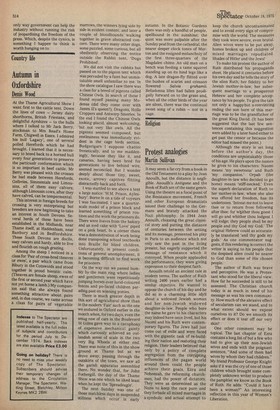Country life
Autumn in Oxfordshire
Denis Wood
At the Thame Agricultural Show I went first to the cattle tent. Down the lines of cows — Jersey dairy shorthorns, British Friesians, and 'delightful Ayrshires — to the bulls where I talked to Mr Jack Berry, stockman to Mrs Read's Home Farm, Chigwell in Essex. I admired his bull 'Lagacy', one of several polled Herefords which he had brought. I learned that it is necessary to breed back to a horned bull every four generations to preserve the particualr conformation which is so important in beef cattle. Mr Berry was pleased with the crosses he had made between Herefords, Gelbvies, Simmentals and Limousins, all of them easy calvers; although Limousin cows, after they have calved, can be tempermental.
This interest in foreign breeds for crossing is very enterprising but breeders are now beginning to take an interest in South Devons. Several herds of these have been established in the Midlands, near Thame itself, at Haddenham, near Banbury and in Bedfordshire. These South Devons are docile, easy calvers and hardy, able to live and flourish on rough grazing.
Among the sheep I noticed in a class for 'Pair of cross-bred theaves or ewes', a pair which came from Bibury in the Cotswolds and stood together in proud hieratic calm. (Theaves are female sheep, ewes of the first or second year which have not yet borne a lamb.) My companion said that she always found something attractive about pairs and, in due course, we came across a class for pairs of vegetable
marrows, the winners lying side by side in evident content; and later a couple of bloodhounds walking together in grave abstracted concern. There were many other dogs, some puzzled, some curious, but all obediently observing the notice outside the Rabbit tent, 'Dogs Prohibited'.
We did not visit the rabbits but passed on to the pigeon tent which was pervaded by a faint but unmistakable smell unfamiliar to me. In the show catalogue I saw there was a class for a breed of pigeons called Chinese Owls. In search of these I found myself passing many Modenas (did they come over with James ll's queen?), Dragons, HoIle Croppers and Antwerp Smerles. In the end I found the Chinese Owls looking placid, almost welcoming, but not very like owls. All the pigeons seemed composed, but restlessness was immediately evident in the cage birds section. Budgerigars I suppose chatter frenetically, and to me maddeningly, because they like it, and canaries, having been bred for generations to live behind wire, seemed reconciled. But I wonder, deeply abuut those tiny, sweet, exotic, arrowy captives flitting distractedly back and forth.
I was startled to see above a tent a large notice: 1-1.M. Prison, Aylesbury'. Borne in on a tide of voyeurs I was fascinated. 1 saw a quarterscale model of a prison block and learned something of prison routines and the work the prisoners do. There were loaves from the bakery and an iced cake with 'Love' piped on a pink heart. In a corner there was a demonstration of work being done transposing school textbooks into Braille for blind children. Unfortunately, in present conditions of general unemployment, it is becoming difficult to find work for prisoners.
On the way out we passed humbly by the main ring where ladies and gentlemen were repetitiously jumping horses over lurid-coloured fences and po-faced children parading past on winning ponies.
There is much greater depth in this sort of agricultural show than in the modern 'Fair' such as the one we endured in Oxford earlier in the month when, for two days, even the smug row of cars in the Boulevard St Gilles gave way to a cacophony of expensive mechanical gaiety which curiously achieved an out landish sense of scale in the two very Big Wheels at either end.
There was none of this in the show ,ground at Thame but as we drove away, passing through the outskirts of the town, we saw all the garish apparatus assembled there. No wonder that, for John Fothergill, the day of the Thame Show was one which he liked least when he kept the `Spreadeagle'.
The next Sunday was one of those matchless days in suspended stillness which occur" in early autumn. In the Botanic Gardens there was only a handful of people, spellbound in the sunshine; the quiet was more palpable after the Sunday peal from the cathedral, the nearer deeper clock tones of Merton and the resigned melancholy of the first three-quarters of the Magdalen chime. An old man on a bench was feeding a tame squirrel standing up on its hind legs like a dog. A late dragon-fly flitted over the bushes of scarlet and crimson
flowered Salvia grahamii. Belladonna lilies had fallen prodigally forward on to the grass and, when all the other birds of the year are silent, there was the continual sweet song of a robin — not in a cage.


































 Previous page
Previous page